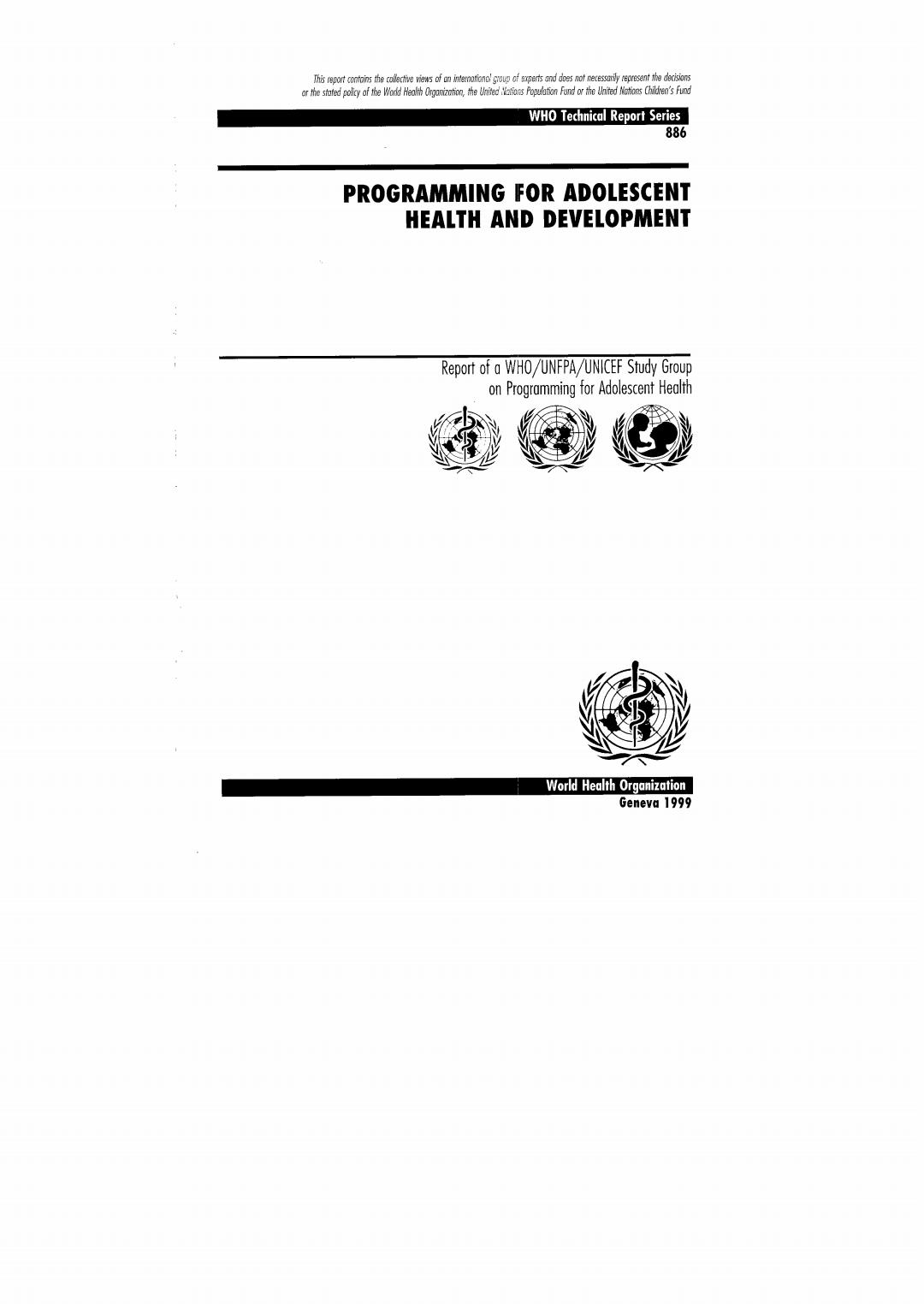
This repot contoins the collective views of on internotiona group of axperts and does not necessarily represent the decisions or the stated policy of the World Health Organization,the United Population Fund or the United Notions Children's Fund WHO Technical Report Series 886 PROGRAMMING FOR ADOLESCENT HEALTH AND DEVELOPMENT Report of a WHO/UNFPA/UNICEF Study Group on Programming for Adolescent Health World Health Organization Geneva 1999
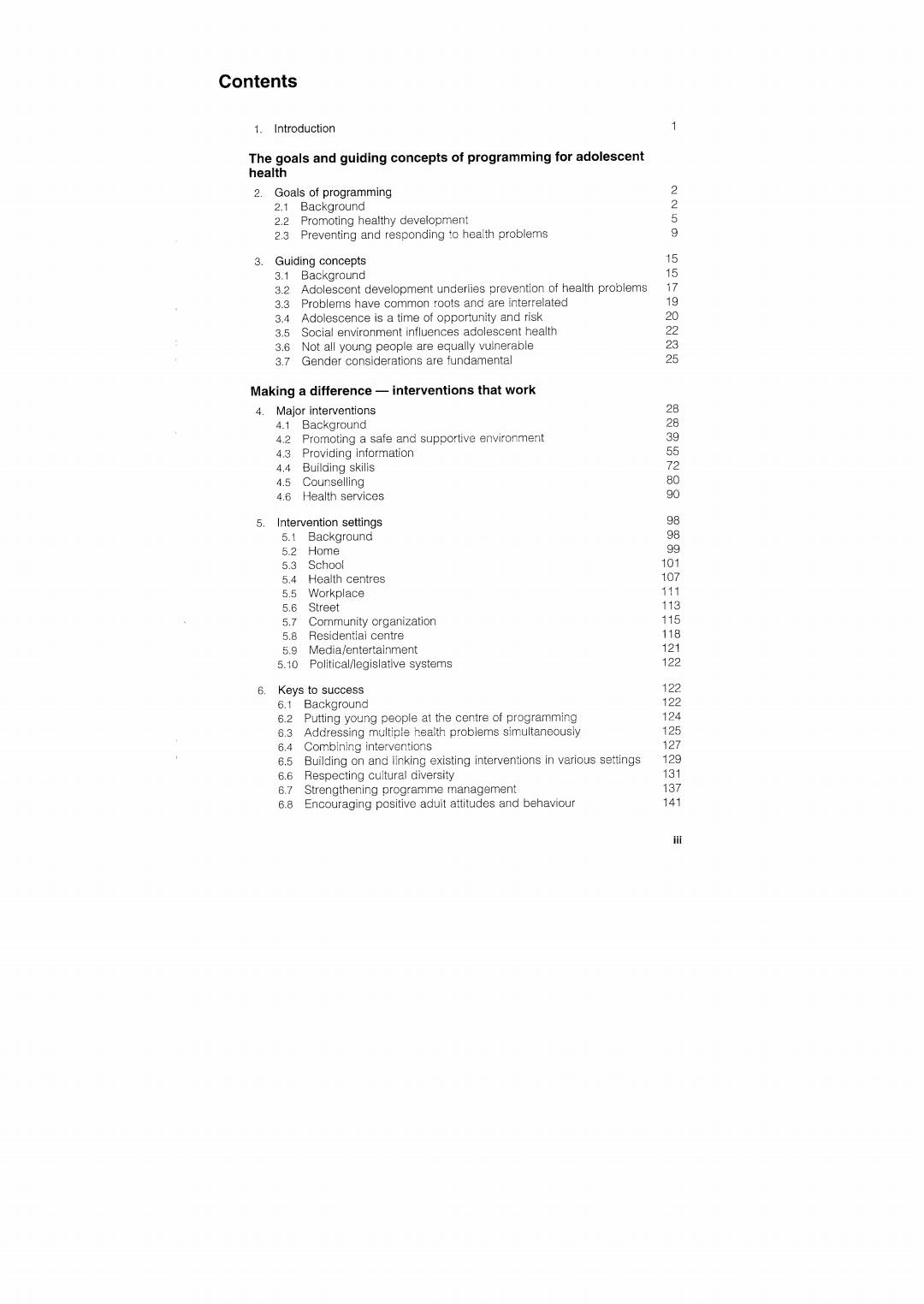
Contents 1.Introduction 1 The goals and guiding concepts of programming for adolescent health 2.Goals of programming 2 2.1 Background 2 2.2 Promoting healthy development 5 2.3 Preventing and responding to health problems 9 3.Guiding concepts 15 3.1 Background 15 3.2 Adolescent development underlies prevention of health problems 17 3.3 Problems have common roots and are interrelated 19 3.4 Adolescence is a time of opportunity and risk 20 3.5 Social environment influences adolescent health 22 3.6 Not all young people are equally vuinerable 2 3.7 Gender considerations are fundamental Making a difference-interventions that work 4. Major interventions 4.1 Backaround 4.2 Promoting a safe and supportive environment 3 4.3 Providing information 4.4 Building skilis 72 4.5 Counselling 80 4.6 Health services 5.Intervention settings 98 5.1 Background 5.2 Home 9 5.3 School 5.4 Health centres 107 5.5 Workplace 111 5.6 Street 5.7 Community organization 115 5.8 Residential centre 118 5.9 Media/entertainment 121 5.10 Political/legislative systems 6.Keys to success 122 6.1 Background 122 6.2 Putting young people at the centre of programming 124 6.3 Addressing multiple health problems simultaneously 125 6.4 Combining interventions 127 6.5 Building on and linking existing interventions in various settings 129 6.6 Respecting cultural diversity 131 6.7 Strengthening programme management 137 6.8 Encouraging positive aduit attitudes and behaviour 141
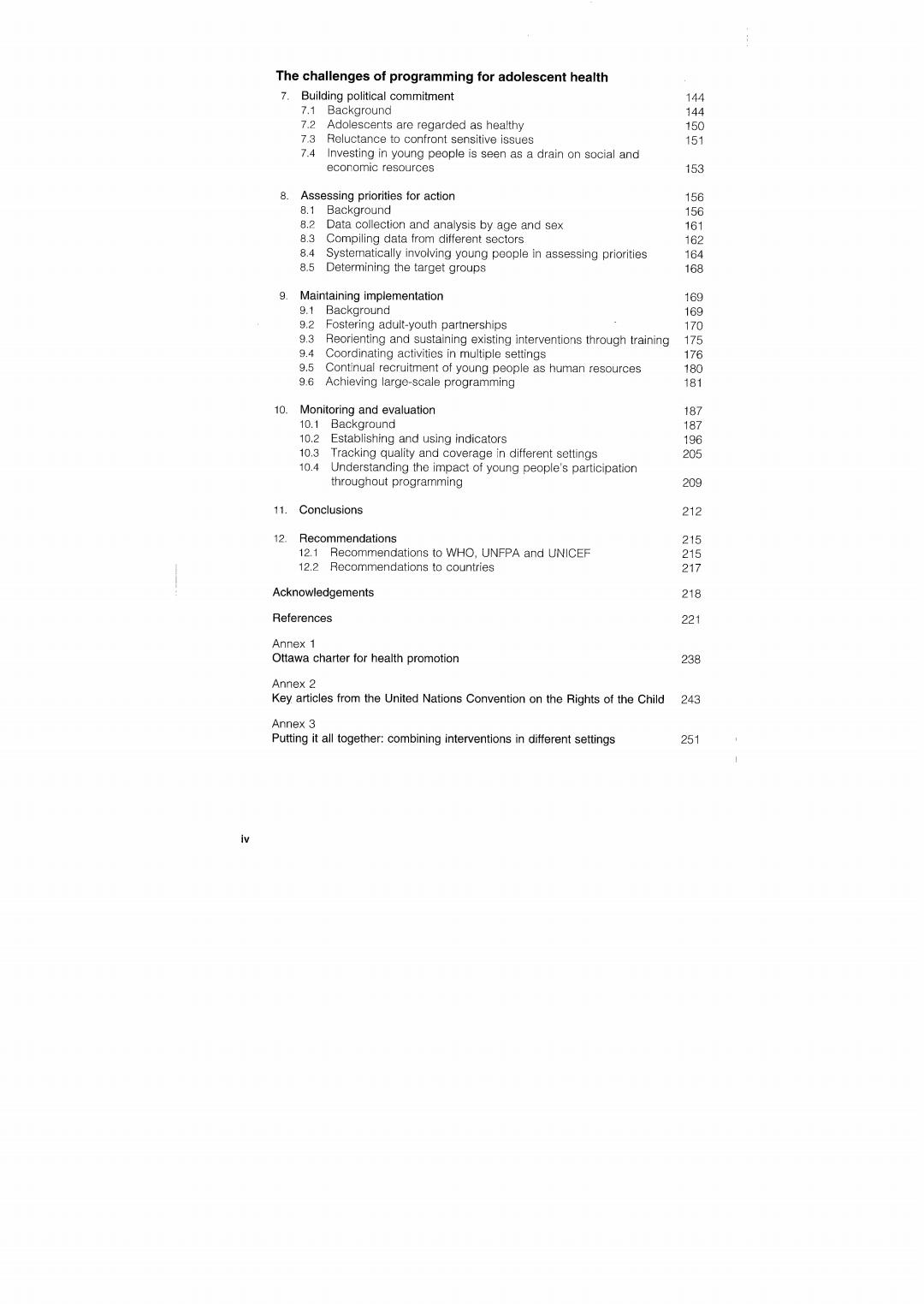
The challenges of programming for adolescent health 7.Building political commitment 144 7.1 Background 144 7.2 Adolescents are regarded as healthy 150 7.3 Reluctance to confront sensitive issues 151 7.4 Investing in young people is seen as a drain on social and economic resources 153 8.Assessing priorities for action 156 8.1 Background 156 8.2 Data collection and analysis by age and sex 161 8.3 Compiling data from different sectors 162 8.4 Systematically involving young people in assessing priorities 164 8.5 Determining the target groups 168 9.Maintaining implementation 169 9.1 Background 169 9.2 Fostering adult-youth partnerships 170 9.3 Reorienting and sustaining existing interventions through training 175 9.4 Coordinating activities in multiple settings 176 9.5 Continual recruitment of young people as human resources 180 9.6 Achieving large-scale programming 181 10.Monitoring and evaluation 187 10.1 Background 187 10.2 Establishing and using indicators 196 10.3 Tracking quality and coverage in different settings 205 10.4 Understanding the impact of young people's participation throughout programming 209 11.Conclusions 212 12.Recommendations 215 12.1 Recommendations to WHO,UNFPA and UNICEF 215 12.2 Recommendations to countries 217 Acknowledgements 218 References 221 Annex 1 Ottawa charter for health promotion 238 Annex 2 Key articles from the United Nations Convention on the Rights of the Child 243 Annex 3 Putting it all together:combining interventions in different settings 251 iv
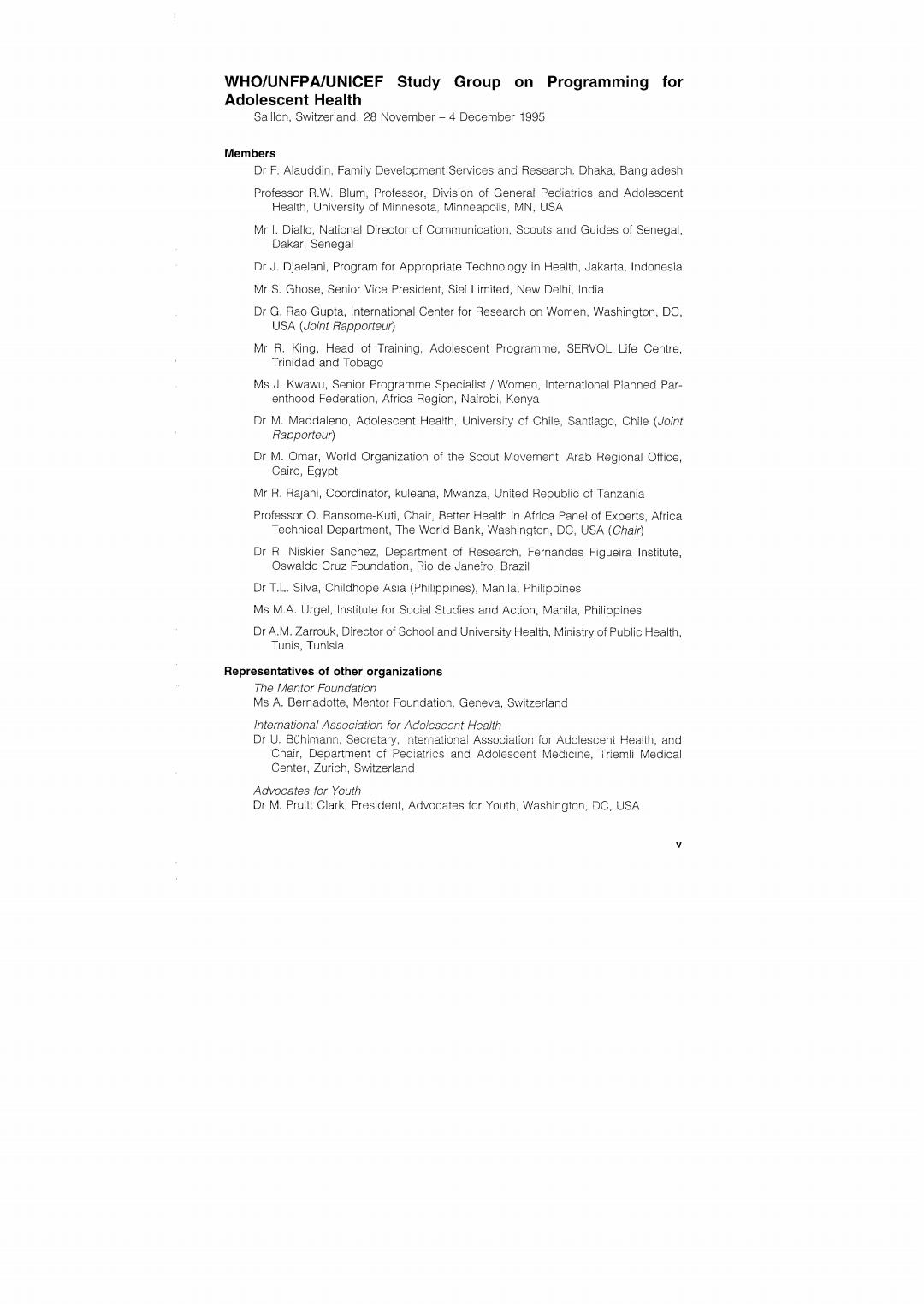
WHO/UNFPA/UNICEF Study Group on Programming for Adolescent Health Saillon,Switzerland,28 November-4 December 1995 Members Dr F.Alauddin,Family Development Services and Research.Dhaka,Bangladesh Professor R.W.Blum,Professor,Division of General Pediatrics and Adolescen Health,University of Minnesota,Minneapolis,MN,USA Mr I.Diallo,National Director of Communication,Scouts and Guides of Senegal, Dakar,Senegal Dr J.Djaelani,Program for Appropriate Technology in Health,Jakarta,Indonesia Mr S.Ghose,Senior Vice President,Siel Limited,New Delhi,India Dr G.Rao Gupta,International Center for Research on Women,Washington,DC. USA (Joint Rapporteur) Mr R.King,Head of Training,Adolescent Programme,SERVOL Life Centre, Trinidad and Tobago Ms J.Kwawu,Senior Programme Specialist /Women,International Planned Par- enthood Federation,Africa Region,Nairobi,Kenya Dr M.Maddaleno,Adolescent Health,University of Chile,Santiago,Chile (Joint Rapporteur) Dr M.Omar,World Organization of the Scout Movement,Arab Regional Office, Cairo,Egypt Mr R.Rajani,Coordinator,kuleana,Mwanza,United Republic of Tanzania Professor O.Ransome-Kuti,Chair,Better Health in Africa Panel of Experts,Africa Technical Department,The World Bank,Washington,DC,USA(Chair) Dr R.Niskier Sanchez,Department of Research.Fernandes Figueira Institute, Oswaldo Cruz Foundation,Rio de Jane'ro,Brazil Dr T.L.Silva,Childhope Asia(Philippines),Manila,Philippines Ms M.A.Urgel,Institute for Social Studies and Action,Manila,Philippines Dr A.M.Zarrouk,Director of School and University Health,Ministry of Public Health, Tunis,Tunisia Representatives of other organizations The Mentor Foundation Ms A.Bernadotte,Mentor Foundation.Geneva,Switzerland International Association for Adolescent Health Dr U.Buhlmann,Secretary,International Association for Adolescent Health,and Chair,Department of Pediatrics and Adolescent Medicine,Triemli Medical Center,Zurich,Switzerland Advocates for Youth Dr M.Pruitt Clark,President,Advocates for Youth,Washington,DC,USA
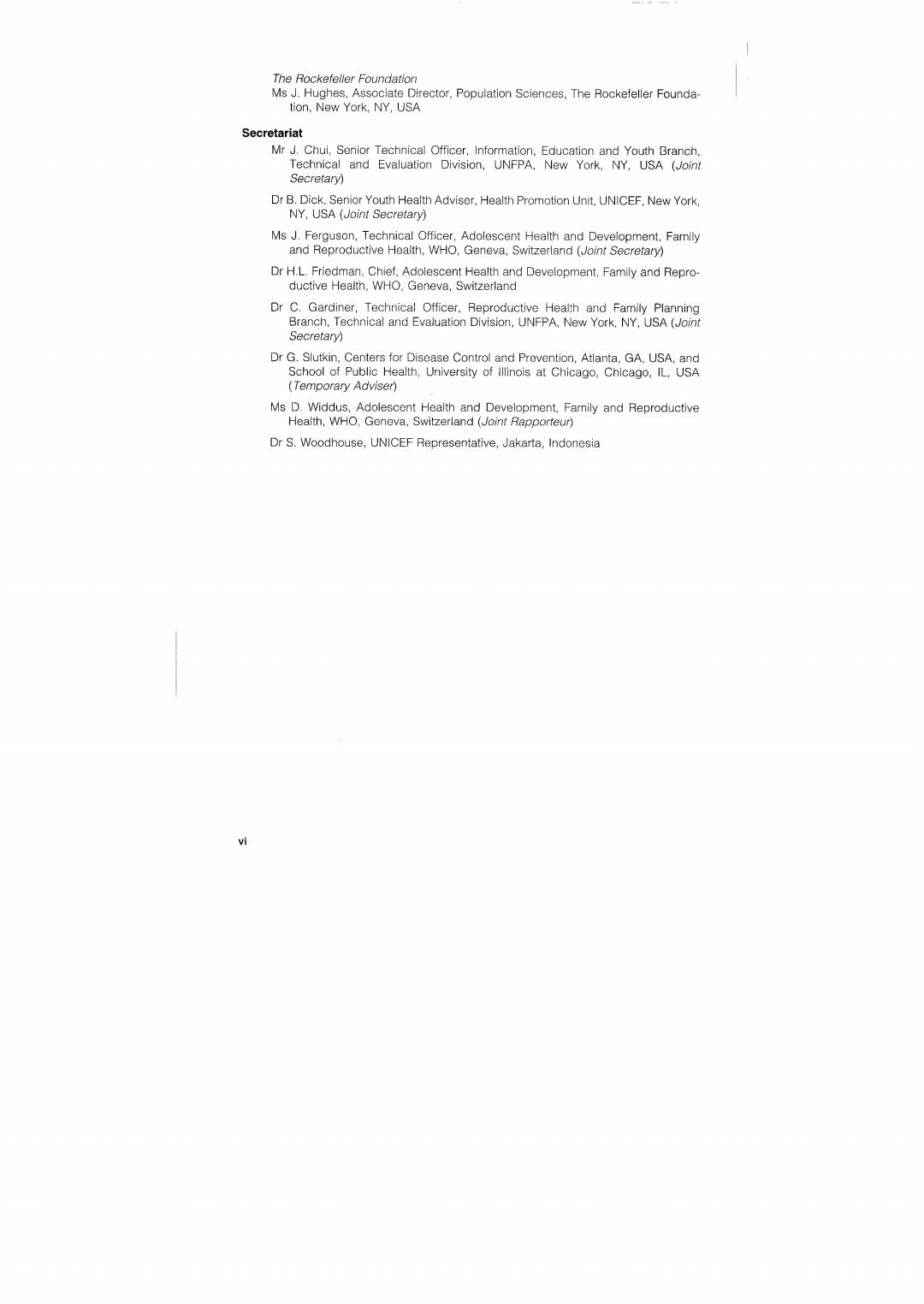
The Rockefeller Foundation Ms J.Hughes,Associate Director,Population Sciences,The Rockefeller Founda- tion,New York,NY,USA Secretariat Mr J.Chui,Senior Technical Officer,Information,Education and Youth Branch, Technical and Evaluation Division,UNFPA,New York,NY,USA (Joint Secretary) Dr B.Dick,Senior Youth Health Adviser,Health Promotion Unit,UNICEF,New York, NY,USA (Joint Secretary) Ms J.Ferguson,Technical Officer,Adolescent Health and Development,Family and Reproductive Health,WHO,Geneva,Switzerland (Joint Secretary) Dr H.L.Friedman,Chief,Adolescent Health and Development,Family and Repro- ductive Health,WHO,Geneva,Switzerland Dr C.Gardiner,Technical Officer,Reproductive Health and Family Planning Branch,Technical and Evaluation Division,UNFPA,New York,NY,USA(Joint Secretary) Dr G.Slutkin,Centers for Disease Control and Prevention,Atlanta,GA,USA,and School of Public Health,University of Illinois at Chicago,Chicago,IL,USA (Temporary Adviser) Ms D.Widdus,Adolescent Health and Development,Family and Reproductive Health,WHO,Geneva,Switzerland (Joint Rapporteur) Dr S.Woodhouse,UNICEF Representative,Jakarta,Indonesia